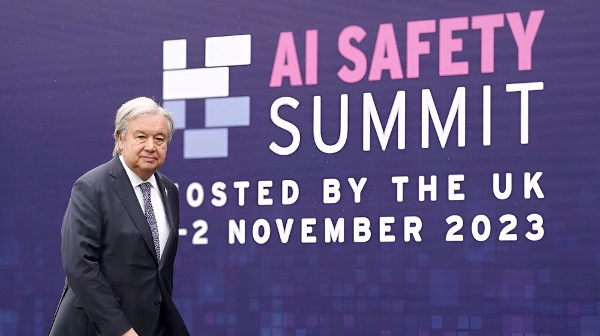image1
The UN chief has called for a "united, sustained, global response" to the AI threat. (Photo by AFP)
UN Secretary-General Antonio Guterres has called for a "united, sustained, global response" to artificial intelligence threats, as world leaders meet in Britain to discuss the risks posed by the technologyís rapid development.
Speaking at the inaugural of the Artificial Intelligence (AI) Safety Summit in London, Guterres said on Thursday that the world is "playing catch up" and needs to "get ahead of the wave."
The UN chief added that AI risked "possible long-term negative consequences" on everything from jobs to culture while its concentration in a few countries and companies "could increase geopolitical tensions".
In a statement, he also warned that it might "exacerbate the enormous inequalities that already plague our world", demanding a "united, sustained, global strategy, based on multilateralism and the participation of all stakeholders".
"New solutions should be based on existing principles found in this organizationís 1945 charter and the Universal Declaration of Human Rights," he added.
The AI Safety Summit that started on Wednesday was attended by political and technological leaders mainly from the Western nations. An agreement signed by 28 countries and the European Union acknowledging the "need for international action" was published at the summit.
On Thursday, senior representatives from Western nations met to address AIís most pressing imminent threats. Those in attendance included UK Prime Minister Rishi Sunak, US Vice President Kamala Harris, Italian Prime Minister Giorgia Meloni and EU chief Ursula von der Leyen.
Tech giants like Elon Musk and representatives of companies that lead in AI, such as OpenAI, Anthropic, Google DeepMind and Microsoft attended the meetings.
The U.N. last week created a 39-member advisory body to address issues in the international governance of AI. The body expects to submit a preliminary report by the end of this year and a final one next year.
The release of ChatGPT and other generative AI systems that produce text, images and audio from simple commands has offered a peep into the technologyís potential.
AI has prompted concerns around the world. Issues like AI replacing humans at various jobs, cyber-attacks and the misuse of technology in other ways have raised questions over the emerging technology.
China, which attended the inaugural session of the conference on Wednesday, was not invited to more sensitive discussions on the largely behind-closed-doors second-day sessions.
SpaceX and Tesla CEO Elon Musk attended both days, describing the event as "timely".
"Itís one of the existential risks that we face and it is potentially the most pressing one if you look at the timescale and rate of advancement," Musk said.
Future AI safety summits are scheduled for South Korea and France over the coming year.
"Alarm bells over the latest form of artificial intelligence - generative AI - are deafening. And they are loudest from the developers who designed it," Guterres had said in June.
"These scientists and experts have called on the world to act, declaring AI an existential threat to humanity on a par with the risk of nuclear war. We must take those warnings seriously."
UN chief Antonio had backed a proposal by some AI executives for the creation of an international AI watchdog body like the International Atomic Energy Agency.











